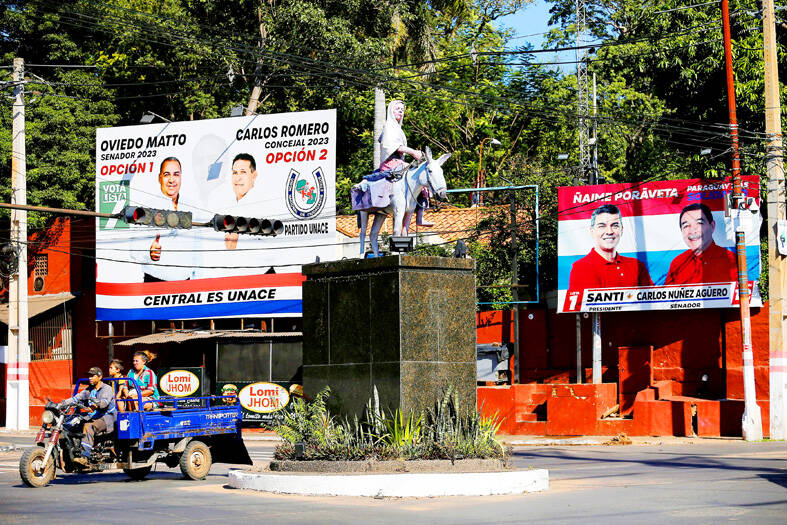Paraguayans yesterday headed to the polls in what could be the biggest electoral challenge to the ruling conservative Colorado Party in more than a decade, and with the country’s near 70-year ties with Taiwan potentially at stake.
The landlocked South American country of fewer than 7 million people started voting from 7am. Lawyer Efrain Alegre, 60, of the Concertacion center-left coalition is leading narrowly in opinion polls amid a recent anti-incumbency trend in Latin American elections.
His main challenger is Santiago Pena, a 44-year-old economist and former finance minister hoping to continue the rule of the Colorado Party, which has governed almost continually since 1947 — through a dictatorship and since the return of democracy in 1989, but has been hit by a slowing economy and graft allegations.

Photo: CNA
“I want change, yes, but not with Colorado, because it’s been them for over 70 years and we are suffering,” said Miriam Sanabria, a food vendor in Asuncion. “We need work, better security and free medicine at hospitals.”
In the streets and news debates, the political buildup has been dominated by the economy, corruption allegations and the candidates’ views on Taiwan. Taiwan only has 13 diplomatic allies.
Alegre has criticized Paraguay’s diplomatic relations with Taiwan, which have made it hard to sell soy and beef to China, a major global buyer, and has said that the Latin American farm-driven economy does not get enough in return from Taipei.
Pena has said he would maintain ties with Taiwan.
Nearly 5 million people were registered to vote in yesterday’s single-round winner-takes all presidential race. Paraguayans are also electing members of Congress and governors. The first results are expected from about 7pm.
In final campaign events, Alegre took aim at corruption charges that have dogged Colorado Party leader Horacio Cartes, who was sanctioned by the US Department of the Treasury this year.
He called him the “Pablo Escobar of Paraguay.”
Cartes denies the allegations.
Pena acknowledged party divisions in his closing ceremony speech and promised to be “a symbol of party unity.”
Additional reporting by AFP

MISINFORMATION: The generated content tends to adopt China’s official stance, such as ‘Taiwan is currently governed by the Chinese central government,’ the NSB said Five China-developed artificial intelligence (AI) language models exhibit cybersecurity risks and content biases, an inspection conducted by the National Security Bureau (NSB) showed. The five AI tools are: DeepSeek, Doubao (豆包), Yiyan (文心一言), Tongyi (通義千問) and Yuanbao (騰訊元寶), the bureau said, advising people to remain vigilant to protect personal data privacy and corporate business secrets. The NSB said it, in accordance with the National Intelligence Services Act (國家情報工作法), has reviewed international cybersecurity reports and intelligence, and coordinated with the Ministry of Justice Investigation Bureau and the National Police Agency’s Criminal Investigation Bureau to conduct an inspection of China-made AI language

LIMITS: While China increases military pressure on Taiwan and expands its use of cognitive warfare, it is unwilling to target tech supply chains, the report said US and Taiwan military officials have warned that the Chinese People’s Liberation Army (PLA) could implement a blockade within “a matter of hours” and need only “minimal conversion time” prior to an attack on Taiwan, a report released on Tuesday by the US Senate’s China Economic and Security Review Commission said. “While there is no indication that China is planning an imminent attack, the United States and its allies and partners can no longer assume that a Taiwan contingency is a distant possibility for which they would have ample time to prepare,” it said. The commission made the comments in its annual

CHECKING BOUNDARIES: China wants to disrupt solidarity among democracies and test their red lines, but it is instead pushing nations to become more united, an expert said The US Department of State on Friday expressed deep concern over a Chinese public security agency’s investigation into Legislator Puma Shen (沈伯洋) for “secession.” “China’s actions threaten free speech and erode norms that have underpinned the cross-strait ‘status quo’ for decades,” a US Department of State spokesperson said. The Chongqing Municipal Public Security Bureau late last month listed Shen as “wanted” and launched an investigation into alleged “secession-related” criminal activities, including his founding of the Kuma Academy, a civil defense organization that prepares people for an invasion by China. The spokesperson said that the US was “deeply concerned” about the bureau investigating Shen

‘TROUBLEMAKER’: Most countries believe that it is China — rather than Taiwan — that is undermining regional peace and stability with its coercive tactics, the president said China should restrain itself and refrain from being a troublemaker that sabotages peace and stability in the Indo-Pacific region, President William Lai (賴清德) said yesterday. Lai made the remarks after China Coast Guard vessels sailed into disputed waters off the Senkaku Islands — known as the Diaoyutai Islands (釣魚台) in Taiwan — following a remark Japanese Prime Minister Sanae Takaichi made regarding Taiwan. Takaichi during a parliamentary session on Nov. 7 said that a “Taiwan contingency” involving a Chinese naval blockade could qualify as a “survival-threatening situation” for Japan, and trigger Tokyo’s deployment of its military for defense. Asked about the escalating tensions